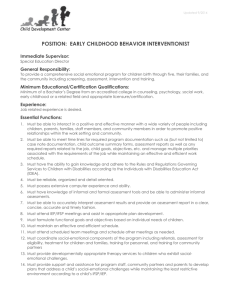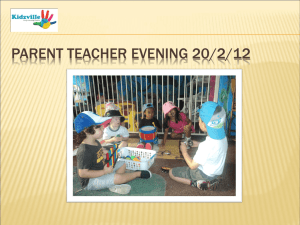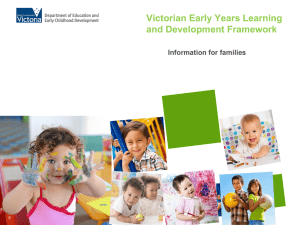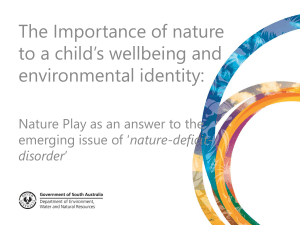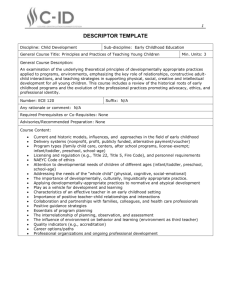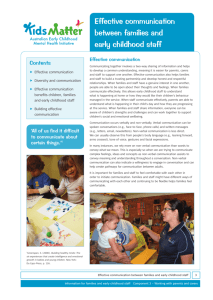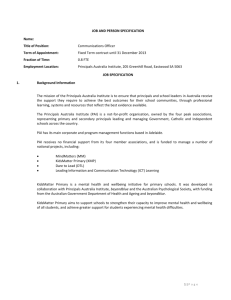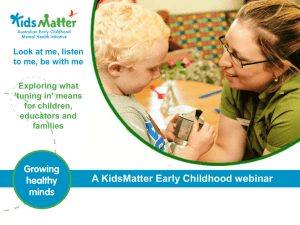Developing children`s social and emotional skills
advertisement
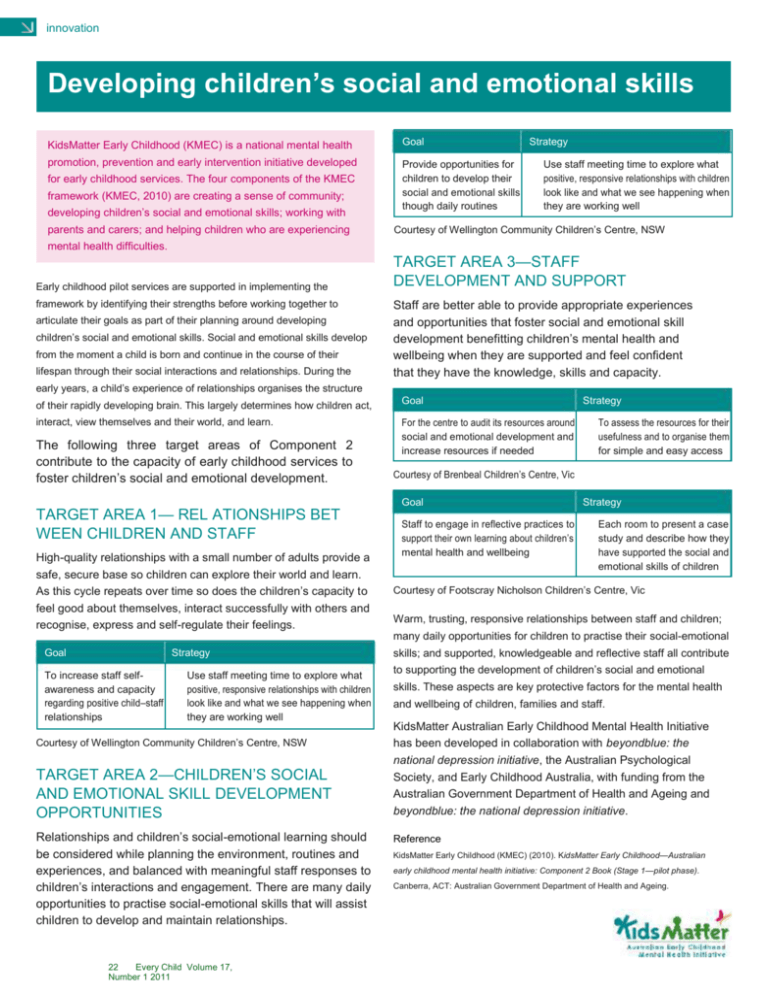
innovation Developing children’s social and emotional skills KidsMatter Early Childhood (KMEC) is a national mental health Goal promotion, prevention and early intervention initiative developed Provide opportunities for children to develop their social and emotional skills though daily routines for early childhood services. The four components of the KMEC framework (KMEC, 2010) are creating a sense of community; developing children’s social and emotional skills; working with parents and carers; and helping children who are experiencing Strategy Use staff meeting time to explore what positive, responsive relationships with children look like and what we see happening when they are working well Courtesy of Wellington Community Children’s Centre, NSW mental health difficulties. Early childhood pilot services are supported in implementing the framework by identifying their strengths before working together to articulate their goals as part of their planning around developing children’s social and emotional skills. Social and emotional skills develop from the moment a child is born and continue in the course of their lifespan through their social interactions and relationships. During the TARGET AREA 3—STAFF DEVELOPMENT AND SUPPORT Staff are better able to provide appropriate experiences and opportunities that foster social and emotional skill development benefitting children’s mental health and wellbeing when they are supported and feel confident that they have the knowledge, skills and capacity. early years, a child’s experience of relationships organises the structure of their rapidly developing brain. This largely determines how children act, Goal interact, view themselves and their world, and learn. For the centre to audit its resources around social and emotional development and increase resources if needed The following three target areas of Component 2 contribute to the capacity of early childhood services to foster children’s social and emotional development. High-quality relationships with a small number of adults provide a safe, secure base so children can explore their world and learn. As this cycle repeats over time so does the children’s capacity to feel good about themselves, interact successfully with others and recognise, express and self-regulate their feelings. To assess the resources for their usefulness and to organise them for simple and easy access Courtesy of Brenbeal Children’s Centre, Vic Goal TARGET AREA 1— REL ATIONSHIPS BET WEEN CHILDREN AND STAFF Strategy Staff to engage in reflective practices to support their own learning about children’s mental health and wellbeing Strategy Each room to present a case study and describe how they have supported the social and emotional skills of children Courtesy of Footscray Nicholson Children’s Centre, Vic Warm, trusting, responsive relationships between staff and children; many daily opportunities for children to practise their social-emotional Goal Strategy To increase staff selfawareness and capacity regarding positive child–staff relationships Use staff meeting time to explore what positive, responsive relationships with children look like and what we see happening when they are working well Courtesy of Wellington Community Children’s Centre, NSW TARGET AREA 2—CHILDREN’S SOCIAL AND EMOTIONAL SKILL DEVELOPMENT OPPORTUNITIES Relationships and children’s social-emotional learning should be considered while planning the environment, routines and experiences, and balanced with meaningful staff responses to children’s interactions and engagement. There are many daily opportunities to practise social-emotional skills that will assist children to develop and maintain relationships. 22 Every Child Volume 17, Number 1 2011 skills; and supported, knowledgeable and reflective staff all contribute to supporting the development of children’s social and emotional skills. These aspects are key protective factors for the mental health and wellbeing of children, families and staff. KidsMatter Australian Early Childhood Mental Health Initiative has been developed in collaboration with beyondblue: the national depression initiative, the Australian Psychological Society, and Early Childhood Australia, with funding from the Australian Government Department of Health and Ageing and beyondblue: the national depression initiative. Reference KidsMatter Early Childhood (KMEC) (2010). KidsMatter Early Childhood—Australian early childhood mental health initiative: Component 2 Book (Stage 1—pilot phase). Canberra, ACT: Australian Government Department of Health and Ageing.
